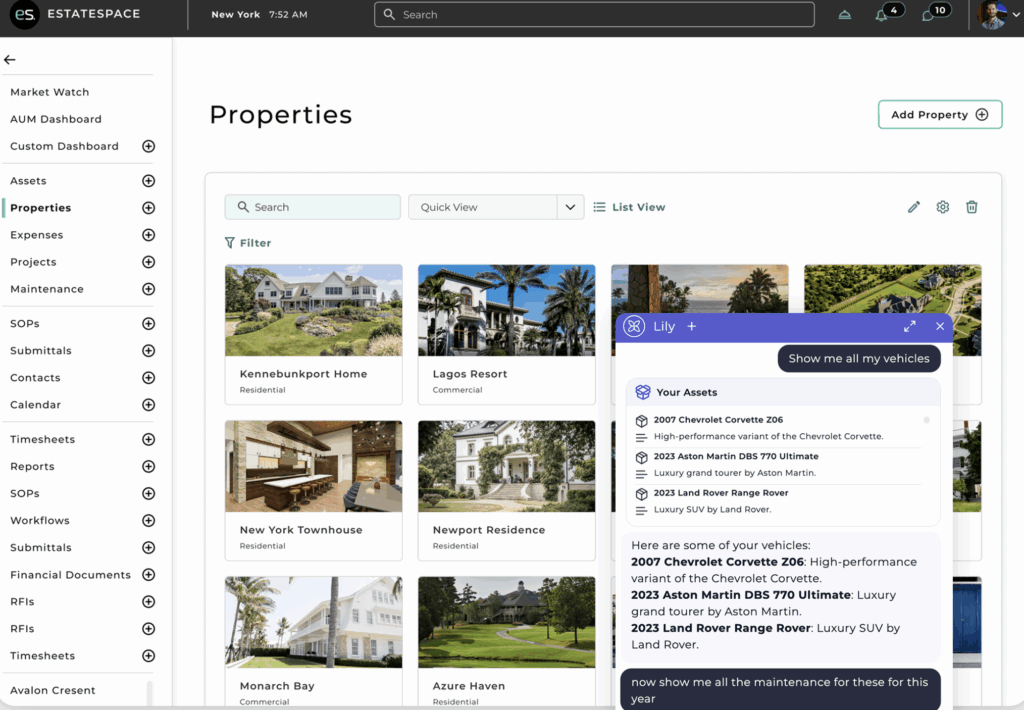If you’re in property management for luxury assets, you know the Monday morning feeling. Your inbox is flooded with vendor invoices. Three contractors are asking about scheduling conflicts. There’s an urgent text about a broken elevator in the downtown building. Meanwhile, your client wants a budget update for the penthouse renovation. You’re still hunting through last month’s receipts.
Property management for high-value assets isn’t just about bigger numbers. It’s about completely different expectations, timelines, and complexity levels. Standard property management tools simply weren’t built to handle this.
The High-Stakes Reality of Luxury Property Management
Managing luxury properties means juggling million-dollar renovations while ensuring the housekeeper has keys. You coordinate between architects and interior designers while tracking down invoices from six different vendors. You maintain white-glove service standards across properties that might be thousands of miles apart.
You’re not just a property manager. You’re a project coordinator, budget analyst, vendor relationship manager, and client communications specialist all rolled into one.
What Your Day Actually Looks Like
Every property manager knows this routine:
- Morning vendor calls about scheduling, pricing, and availability across multiple properties
- Invoice reconciliation trying to match receipts with approved work orders
- Budget tracking across ongoing projects, regular maintenance, and unexpected repairs
- Client updates requiring you to pull information from multiple systems and spreadsheets
- Vendor vetting for specialized services that luxury properties require
The challenge isn’t just the volume—it’s that every task involves multiple moving parts. Furthermore, one delayed vendor can cascade into scheduling conflicts across an entire portfolio.
Where Standard Property Management Tools Break Down
Traditional property management software was designed for apartment complexes and rental properties. These have standardized units, predictable maintenance schedules, and routine tenant interactions. Luxury property management is completely different.
The Vendor Coordination Nightmare
Managing vendors for luxury properties means dealing with specialized craftsmen, artists, high-end contractors, and niche service providers. For example, you might have a restoration specialist for antique fixtures. Additionally, you might work with custom millwork contractors for built-in furniture. Similarly, you coordinate with high-end landscape architects for seasonal installations. Finally, you manage technology specialists for smart home systems.
Each vendor has different communication preferences, scheduling requirements, and billing practices. As industry research shows, property managers face big challenges when sourcing reliable vendors that meet their specific needs. Trying to coordinate them through email and phone calls while tracking invoices in spreadsheets creates missed deadlines and cost overruns.
Budget Management Complexity
Luxury property budgets aren’t just bigger—they’re completely different. Specifically, you’re managing ongoing maintenance for complex systems. In addition, you handle capital improvements involving multiple contractors. Moreover, you deal with emergency repairs requiring immediate premium-cost solutions. Lastly, you manage seasonal preparations for properties in different climates.
Without real-time visibility into spending across all categories and properties, it’s nearly impossible to give clients accurate budget updates. It’s also hard to catch cost overruns before they become serious problems.
The Invoice and Expense Tracking Challenge
Here’s what standard property management software doesn’t handle well: the complexity of luxury property expenses. Essentially, you’re managing invoices from dozens of vendors with different billing cycles, project-based pricing, and specialized services. Some bills come monthly. In contrast, others are project-based. Meanwhile, emergency repairs generate invoices that need immediate approval and payment.
At the same time, you need to categorize expenses for tax purposes. Additionally, you track spending against project budgets. Furthermore, you provide detailed financial reporting that meets the high expectations of wealthy clients and their financial teams.
Property Management Renovation and Enhancement Reality
Standard property management assumes routine maintenance and occasional unit turnover. However, luxury property management often involves continuous enhancement projects. These include kitchen renovations, bathroom upgrades, smart home installations, and seasonal modifications. All require coordinating multiple trades and maintaining quality standards throughout.
Each project involves multiple vendor coordination across different trades. Additionally, you manage timeline requirements when clients have specific occupancy needs. Furthermore, you handle quality control that goes far beyond standard building codes. Also, you oversee budget management for projects that can easily exceed six figures. Finally, you manage client communication requiring regular updates and approval processes.

Modern Property Management Technology Solutions
The change happens when property management operations embrace platforms built specifically for the complexity of luxury properties and wealthy client expectations.
Smart Vendor Management: Modern platforms centralize all vendor information. Additionally, they track performance history. Moreover, they automate scheduling coordination. As a result, they streamline communication across your entire network of service providers.
Real-Time Budget Intelligence: Instead of scrambling to update spreadsheets, smart systems provide live budget tracking across all properties and projects. Furthermore, they include automated alerts when spending approaches limits.
Automated Invoice Processing: AI-powered systems can categorize expenses. In addition, they match invoices to approved work orders. Consequently, they generate the detailed financial reporting that luxury property management requires.
Project Management Integration: Purpose-built platforms handle the complexity of ongoing renovations and enhancements. Therefore, they coordinate timelines, budgets, and communications in one unified system.
Why Property Management Budgeting Requires Strategic Thinking
Good property management budgeting for luxury properties goes beyond simple expense tracking. Specifically, it requires strategic planning for capital improvements. Additionally, it needs predictive maintenance scheduling. Furthermore, it demands detailed financial reporting that meets the expectations of wealthy clients and their financial advisors.
As a result, smart property managers are moving from reactive expense management to strategic budget planning. Ultimately, this approach maximizes property value while controlling costs.
The Future of Professional Property Management
Property managers who succeed with luxury properties understand something important. Specifically, they need tools designed for their specific challenges. Unfortunately, generic property management software creates more work, not less. This happens when you’re dealing with the complexity of high-value assets and wealthy client expectations.
EstateSpace transforms property management operations by providing smart systems that handle vendor coordination, budget tracking, invoice management, and project oversight through one unified platform. Built specifically for luxury properties and wealthy clients, EstateSpace understands the complexity you deal with every day.
When technology handles routine coordination and provides real-time insights, property managers can focus on what they do best. Ultimately, you maintain exceptional properties and deliver the level of service that luxury clients expect.
Tired of juggling spreadsheets and vendor calls? See how intelligent property management technology can streamline your operations while improving client service.
Explore Our Platform and discover what’s possible when your tools match your expertise.



